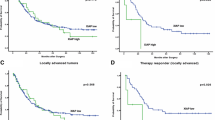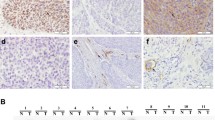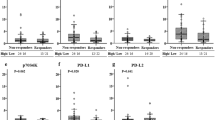Abstract
Esophageal squamous cell carcinoma (ESCC) has a poor prognosis due to high lymphatic metastatic recurrence rates after Ivor Lewis esophagectomy. We sought to investigate the correlation between tumor necrosis factor alpha–induced protein 8 (TNFAIP8) expression and postoperative lymphatic recurrence in patients with pN0 ESCC. One hundred twenty-two patients with pN0 ESCC undergoing Ivor Lewis esophagectomy were enrolled in this study. TNFAIP8 overexpression was found in 73 (59.8 %) tumor specimens. The 3-year lymphatic metastatic recurrence rate among TNFAIP8-overexpressing patients was significantly higher than in TNFAIP8-negative patients (p = 0.003). Multivariate Cox regression identified TNFAIP8 overexpression as an independent risk factor for lymphatic recurrence (p = 0.048). TNFAIP8 messenger RNA (mRNA) levels were significantly higher in patients with lymphatic recurrence than in patients without tumor recurrence (p = 0.019). Stable silencing of TNFAIP8 expression in ESCC-derived cells (Eca109) reduced proliferation, motility, and invasion and induced apoptosis. In addition, transient silencing of TNFAIP8 expression decreased cell motility and invasion and increased apoptosis in a second ESCC-derived cell line (KYSE150). Taken together, these findings suggest that TNFAIP8 overexpression is a potential biomarker to identify pN0 ESCC patients at higher risk of lymphatic recurrence who may benefit from adjuvant therapy.




Similar content being viewed by others
References
Ferlay J, Shin HR, Bray F, Forman D, Mathers C, Parkin DM. Estimates of worldwide burden of cancer in 2008: GLOBOCAN 2008. Int J Cancer. 2010;127:2893–917.
Kamangar F, Dores GM, Anderson WF. Patterns of cancer incidence, mortality, and prevalence across five continents: defining priorities to reduce cancer disparities in different geographic regions of the world. J Clin Oncol. 2006;24:2137–50.
Collard JM, Otte JB, Fiasse R, Laterre PF, De Kock M, Longueville J, et al. Skeletonizing en bloc esophagectomy for cancer. Ann Surg. 2001;234:25–32.
Oezcelik A, Kaiser GM, Niebel W, Sleyman C, Treckmann JW, Sotiropoulos GC, et al. Ten-year survival of esophageal cancer after an en-bloc esophagectomy. J Surg Oncol. 2012;105:284–7.
Song Y, Wang Z, Liu X, Jiang W, Shi M. CCR7 and VEGF-C: molecular indicator of lymphatic metastatic recurrence in pN0 esophageal squamous cell carcinoma after Ivor-Lewis esophagectomy? Ann Surg Oncol. 2012;19:3606–12.
Hulscher JB, van Sandick JW, Tijssen JG, Obertop H, van Lanschot JJ. The recurrence pattern of esophageal carcinoma after transhiatal resection. J Am Coll Surg. 2000;191:143–8.
Stahl M, Budach W, Meyer HJ, Cervantes A. ESMO guidelines working group. Esophageal cancer: clinical practice guidelines for diagnosis, treatment and follow-up. Ann Oncol. 2010;21:v46–9.
National Comprehensive Cancer Network. NCCN clinical practice guideline in oncology (NCCN guideline): Esophageal and esophagogastric junction cancers. 2015. http://www.nccn.org/professionals/physician_gls/f_guidelines.asp#site. Accessed 23 March 2015.
Akhtar J, Wang Z, Jiang WP, Bi MM, Zhang ZP. Stathmin overexpression identifies high-risk of lymphatic metastatic recurrence in pN0 esophageal squamous cell carcinoma patients. J Gastroenterol Hepatol. 2013;29:944–50.
Godfrey TE, Raja S, Finkelstein SD, Gooding WE, Kelly LA, Luketich JD. Prognostic value of quantitative reverse transcription polymerase chain reaction in lymph node-negative esophageal cancer patients. Clin Cancer Res. 2001;7:4041–8.
Li SH, Wang Z, Liu XY. Metastasis-associated protein 1 (MTA1) overexpression is closely associated with shorter disease-free interval after complete resection of histologically node-negative esophageal cancer. World J Sug. 2009;33:1876–81.
Patel S, Wang FH, Whiteside TL, Kasid U. Identification of seven differentially displayed transcripts in human primary and matched metastatic head and neck squamous cell carcinoma cell lines: implications in metastasis and/or radiation response. Oral Oncol. 1997;33:197–203.
Kumar D, Whiteside TL, Kasid U. Identification of a novel tumor necrosis factor-alpha-inducible gene, SCC-S2, containing the consensus sequence of a death effector domain of fas-associated death domain-like interleukin-1 beta-converting enzyme-inhibitory protein. J Biol Chem. 2000;275:2973–8.
Dong QZ, Zhao Y, Liu Y, Wang Y, Zhang PX, Jiang GY, et al. Overexpression of SCC-S2 correlates with lymph node metastasis and poor prognosis in patients with non-small-cell lung cancer. Cancer Sci. 2010;101:1562–9.
Kumar D, Gokhale P, Broustas C, Chakravarty D, Ahmad I, Kasid U. Expression of SCC-S2, an antiapoptotic molecule, correlates with enhanced proliferation and tumorigenicity of MDA-MB 435 cells. Oncogene. 2004;23:612–6.
Zhang C, Chakravarty D, Sakabe I, Mewani RR, Boudreau HE, Kumar D, et al. Role of SCC-S2 in experimental metastasis and modulation of VEGFR-2, MMP-1, and MMP-9 expression. Mol Ther. 2006;13:947–55.
Liu T, Gao H, Yang M, Zhao T, Liu Y, Lou G. Correlation of TNFAIP8 overexpression with the proliferation, metastasis, and disease-free survival in endometrial cancer. Tumor Biol. 2014;35:5805–14.
Miao Z, Zhao T, Wang Z, Xu Y, Song Y, Wu J, et al. SCC-S2 is overexpressed in colon cancers and regulates cell proliferation. Tumor Biol. 2012;33:2099–106.
Liu T, Gao H, Chen X, Lou G, Gu L, Yang M, et al. TNFAIP8 as a predictor of metastasis and a novel prognostic biomarker in patients with epithelial ovarian cancer. Br J Cancer. 2013;109:1685–92.
Yang M, Zhao Q, Wang X, Liu T, Yao G, Lou C, et al. TNFAIP8 overexpression is associated with lymph node metastasis and poor prognosis in intestinal-type gastric adenocarcinoma. Histopathology. 2014;65:517–26.
Zhang C, Kallakury BV, Ross JS, Mewani RR, Sheehan CE, Sakabe I, et al. The significance of TNFAIP8 in prostate cancer response to radiation and docetaxel and disease recurrence. Int J Cancer. 2013;133:31–42.
Hadisaputri YE, Miyazaki T, Suzuki S, Yokobori T, Kobayashi T, Tanaka N, et al. TNFAIP8 overexpression: clinical relevance to esophageal squamous cell carcinoma. Ann Surg Oncol. 2012;3:S589–96.
Rice TW, Rusch VW, Ishwaran H, Blackstone EH. Worldwide esophageal cancer collaboration. Cancer of the esophagus and esophagogastric junction: data-driven staging for the Seventh Edition of the American Joint Committee on Cancer/International Union Against Cancer Cancer Staging Manuals. Cancer. 2010;116:3763–73.
Akhtar J, Wang Z, Zhang ZP, Bi MM. Lentiviral-mediated RNA interference targeting stathmin1 gene in human gastric cancer cells inhibits proliferation in vitro and tumor growth in vivo. J Transl Med. 2013;11:212.
Law S, Wong J. Two-field dissection is enough for esophageal cancer. Dis Esophagus. 2001;14:98–103.
Chen G, Wang Z, Liu XY, Zhang MY, Liu FY. Clinical study of modified Ivor-Lewis esophagectomy plus adjuvant radiotherapy for local control of stage IIA squamous cell carcinoma in the mid-thoracic esophagus. Eur J Cardiothorac. 2009;35:1–7.
Nakagawa S, Kanda T, Kosugi S, Ohashi M, Suzuki T, Hatakeyama K. Recurrence pattern of squamous cell carcinoma of the thoracic esophagus after extended radical esophagectomy with three-field lymphadenectomy. J Am Coll Surg. 2004;198:205–11.
Hou X, Wei JC, Fu JH, Wang X, Zhang LJ, Lin P, et al. Proposed modification of the seventh American joint committee on cancer staging system for esophageal squamous cell carcinoma in Chinese patients. Ann Surg Oncol. 2014;21:337–42.
Wang ZX, Mao T, Guo XF, Fang WT. Multimodality management of squamous cell carcinoma of thoracic esophagus. Zhonghua Wei Chang Wai Ke Za Zhi. 2013;16:815–8.
You Z, Ouyang H, Lopatin D, Polver PJ, Wang CY. Nuclear factor-kappa B-inducible death effector domain-containing protein suppresses tumor necrosis factor-mediated apoptosis by inhibiting caspase-8 activity. J Biol Chem. 2001;276:26398–404.
Fish RJ, Kruithof EK. Short-term cytotoxic effects and long-term instability of RNAi delivered using lentiviral vectors. BMC Mol Biol. 2004;5:9.
Chen H, Wang Z, Yang Z, Shang B, Liu X, Chen G. Prospective study of adjuvant radiotherapy on preventing lymph node metastasis after Ivor-Lewis esophagectomy in esophageal cancer. Ann Surg Oncol. 2013;20:2721–6.
Zhang HG, Hyde K, Page GP, Brand JP, Zhou J, Yu S, et al. Novel tumor necrosis factor alpha-regulated genes in rheumatoid arthritis. Arthritis Rheum. 2004;50:420–31.
Xu WW, Li B, Lam AK, Tsao SW, Law SY, Chan KW, et al. Targeting VEGFR1- and VEGFR2-expressing non-tumor cells is essential for esophageal cancer therapy. Oncotarget. 2015;6:1790–805.
Acknowledgments
The authors thank the Department of Pathology, Provincial Hospital Affiliated to Shandong University, for specimen collection and staining evaluation. This work is supported by grants from the National Natural Science Foundation of China (No. 81172161), Jinan Science and Technology Plan (201202041). Dr. Meltzer is the Myerberg/Hendrix Professor of Gastroenterology and an American Cancer Society Clinical Research Professor.
Author information
Authors and Affiliations
Corresponding authors
Ethics declarations
Conflict of interests
None
Electronic supplementary material
Below is the link to the electronic supplementary material.
ESM 1
(DOC 565 kb)
Rights and permissions
About this article
Cite this article
Sun, Z., Liu, X., Song, J.H. et al. TNFAIP8 overexpression: a potential predictor of lymphatic metastatic recurrence in pN0 esophageal squamous cell carcinoma after Ivor Lewis esophagectomy. Tumor Biol. 37, 10923–10934 (2016). https://doi.org/10.1007/s13277-016-4978-1
Received:
Accepted:
Published:
Issue Date:
DOI: https://doi.org/10.1007/s13277-016-4978-1




